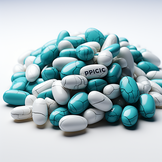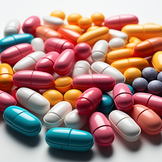What are the side effects of sildenafil?

Introduction to Sildenafil
Sildenafil, commercially known as Viagra, is a widely used medication for the treatment of erectile dysfunction and pulmonary arterial hypertension. It helps increase blood flow to the penis to sustain an erection during sexual intercourse and also assists in reducing high blood pressure in the lungs.
Serious Side Effects
While Sildenafil can be immensely helpful for many patients, it does carry the potential for some severe side effects. These include chest pain, a sudden decrease or loss of vision, allergic reactions, and prolonged or painful erection.
Chest pain may be an indicator of a heart condition exacerbated by Sildenafil. If you experience any chest pain, seek immediate medical attention. Similarly, sudden vision loss is an urgent concern and should be addressed immediately.
Allergic reactions to Sildenafil can manifest as swelling, difficulty breathing, and hives. If you observe any of these symptoms after taking the medication, it's crucial to get emergency medical help right away.
A prolonged or painful erection, known as priapism, is a serious condition that can lead to permanent damage if not treated promptly. Seek immediate medical help if your erection lasts more than four hours or becomes painful.
Managing Common Side Effects
Common side effects of Sildenafil include headaches, heartburn, diarrhea, flushing, and feeling warm. Generally, these side effects are temporary and can be managed with rest and hydration. To help with headaches and flushing, ensure you drink plenty of fluids and rest.
Avoid consuming alcohol while taking Sildenafil as it can enhance certain side effects, particularly dizziness, lightheadedness, and low blood pressure. It can also potentially impair your ability to get an erection, countering the purpose of the medication.
Risks Associated with Sildenafil
Long-term use of Sildenafil comes with certain risks. It can potentially lead to heart attacks, strokes, irregular heartbeat, bleeding in the brain or lungs, high blood pressure, and even sudden death. Although these are rare, they can be severe and should be considered when deciding to use Sildenafil.
Precautions and Interactions
Before starting Sildenafil, inform your doctor of any allergies you may have as you could be allergic to the medication itself or its ingredients. Additionally, disclose all your medical conditions to your doctor, especially if you have a history of heart disease, stroke, or retinal disorders.
Sildenafil can interact with certain medications, including nitrates often prescribed for chest pain and some recreational drugs known as 'poppers'.These can cause a dangerous drop in blood pressure when used in combination with Sildenafil.
Other medication interactions include certain antibiotics, HIV medications, and other erectile dysfunction drugs.
When to Contact Your Doctor
If you experience any severe side effects such as chest pain, sudden vision loss, allergic reactions, or a prolonged or painful erection, contact your doctor immediately. Similarly, if common side effects persist for more than a few hours or become bothersome, seek medical advice.
In terms of frequency, it's generally considered safe to take Sildenafil every day if it's prescribed by your doctor. However, it doesn't guarantee you'll stay hard after orgasm - that varies from individual to individual.
When taking Sildenafil, avoid eating grapefruit or drinking grapefruit juice as it can increase the levels of the drug in your blood and thereby increase the risk of side effects. It's important to remember that the medication should be used responsibly and as directed by your healthcare professional.
In conclusion, while Sildenafil can be a vital treatment for erectile dysfunction and pulmonary arterial hypertension, it carries potential side effects and risks. It's essential to have open and honest communication with your doctor to use this medication safely and effectively.



